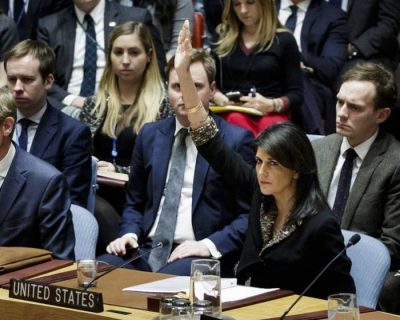Western powers at UN make case for military action against Syria
The United States, Britain and France made the case at the United Nations on Friday for military action against Syria, saying President Bashar al-Assad’s repeated use of chemical weapons posed a threat to the world.
US Ambassador Nikki Haley said no decision had been taken to launch strikes and stressed Washington was taking time to assess the implications of possible military action after Russia warned it could lead to a dangerous US-Russian war.
“Our president has not yet made a decision about possible action in Syria,” Haley told a Security Council meeting.
“But should the United States and our allies decide to act in Syria, it will be in defense of a principle on which we all agree.”
Citing US estimates that Assad has used chemical weapons “at least 50 times” in the seven-year war, Haley said: “All nations and all people will be harmed if we allow Assad to normalize the use of chemical weapons.”
The United States is consulting with Britain and France about a joint military response to an alleged toxic gas attack in the rebel-held town of Douma that medics and rescuers said left at least 40 people dead on Saturday.
“You don’t rush decisions like this,” Haley told reporters ahead of the meeting – the fourth on Syria at the council this week.
Syria and Russia have denied using poisonous gas in Douma on April 7, with Russian Foreign Minister Sergei Lavrov saying that Moscow had evidence that the attack in Douma was staged.
A UN-led panel has determined that Assad’s forces had used sarin in the town of Khan Sheikhun last yaer and chlorine in at least three attacks on villages in 2014 and 2015.
– Intolerable threat to security –
Echoing the US stance, France said Assad’s government had reached a “point of no return” with repeated use of chemical weapons.
“France will shoulder its responsibility to end an intolerable threat to our collective security,” said French Ambassador Francois Delattre, who called for an end to the “chemical weapons escalation in Syria.”
Britain accused Russia of chipping away at international norms on non-proliferation by supporting Assad.
“We will not sacrifice the international order we have collectively built to the Russian desire to protect its ally at all costs,” said Ambassador Karen Pierce.
By supporting Assad, Russia’s actions are “prejudicial to our security” and will let the Islamic State group “re-establish itself” – something that “we believe we need to take action to defend,” said Pierce.
The arguments put forward by the three allies were dismissed by Russia as a pretext to advance the West’s goal of overthrowing Assad and keeping Moscow’s influence in check.
“The sole thing that they have an interest in is to oust the Syrian government and to deter, contain the Russian Federation,” Ambassador Vassily Nebenzia told the council session.
The ambassador urged Britain, France and the United States “not to bring the world to such a dangerous threshold.”
Russia has told the United States that it will not allow its troops on the ground in Syria to be put at risk by military action, even though the two countries have channels of communication to avoid such a clash.
The warning from Moscow came as United Nations Secretary-General Antonio Guterres warned that increasing tensions over Syria could lead to “full-blown military escalation.”
Guterres urged the Security Council to “act responsibly in these dangerous circumstances.”
Syria warned that it will have “no other choice” but to defend itself if the West launches military action.
“This is not a threat, this is a promise,” Syrian Ambassador Bashar Jaafari told the council. (AFP)


